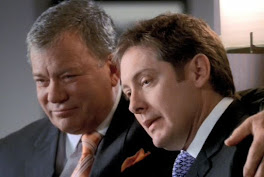Alan & Denny are so much fun because the writers don't disguise the homosocial nature of Alan and Denny's relationship. The characters not only address the issue directly ("We're married," Alan tells Bethany early in Season 3 about his relationship to Denny--and yes, yes, they are), they argue in favor of it. When Denny feels ousted by Alan's friendship with Jerry, he declares that jealousy and fidelity are not qualities exclusive to romantic relationships.
In all truth, Alan and Denny belong to the wrong century (which is rather the point). They are easier with each other than with others, including women, convening at the end of most episodes to drink cognac and smoke cigars while they discuss the details of their episode--oh, I mean "day."
Boston Legal often presents Denny as declaring that until Alan arrived, he was getting tired of the firm. It is easy to see why Denny values Alan, who not only shares his interest in women and his sense of humor as well as his outside-the-box thinking but has the impressive ability to take Denny as he is. When the partners try to get Alan to "handle" Denny over his engagement to Bev, Alan refuses. Denny is his friend. He will accept the fallout of Denny's relationship to Bev as it comes.
The last season of The Practice does a fantastic job explaining why Alan needs Denny.
I backed up from Boston Legal to watch the last season of The Practice in order to get Alan's backstory. In all honesty, I assumed that the final season of the prior show would be a bunch of episodes starring the original Practice cast with a throwaway line at the end about Alan moving over to Denny's law firm.
It isn't. Instead, the season does an impressive job establishing Alan's outsider status. He is entirely alone, and it is rather painful to watch. His is not the "squint" status of Bones and her group, who have each other as well as Booth to back them. His is not the oddity of Data who can yet say that Geordi is his best friend and that Captain Picard trusts him absolutely. Alan's is the quite deliberate exclusion of an off-kilter oddball who goes his own way (I don't believe for a moment that his "antics" would be the reason; I am sure that in the show's 7 prior seasons, the other characters performed plenty of "antics").
He is simply not one of "them," and they never let him forget it.
Alan's lawsuit against the practice comes across as less about money (that is, in fact, owed him) or even a desire for respect (which is also owed him--the firm's low-ball severance pay offer is downright insulting) but a desire to be acknowledged, seen, met half-way.
They never do--they are too much the in-group, too insular, too bullying.
Denny and Alan are initially rather uncertain of each other. Denny's immediate recognition of Alan's ability, however, assuages some of the lingering hurt. Alan's great kindliness to Denny, a kindliness which is inherent to Alan's personality, begins to build the relationship. Alan's sheer delight in Denny's brilliance in the first trial they chair together is touching.In the end, the final episodes of The Practice make clear that Alan needs Denny as much as Denny needs Alan. Denny's utter lack of concern about lines he himself might cross gives Alan license to make himself at home in the firm. Denny is mainstream (he believes) but he is not a joiner. He sees himself first and always as a leader. To adopt an even older analogy than cigar-smoking English gentlemen, Alan gains a medieval-like patron. And he thrives as a result.
"I consider myself many things, Denny, but being loved has never been one of them," he says in the episode where Denny shoots the bad guy who is pointing a gun at Alan. "And now twice in the same day."Of course, that quote is preceded by Denny saying, "Something you Democrats never understand. Americans: we're homesteaders. We want a safe home, keep the money we make, and shoot bad guys. And save the life of someone we love."
That easy affection, one surmises, is something Alan has rarely had.



